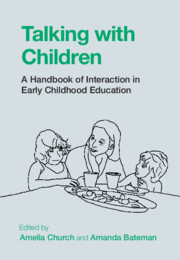Book contents
- Talking with Children
- Talking with Children
- Copyright page
- Dedication
- Contents
- Figures
- Tables
- Contributors
- Acknowledgements
- Notes on Transcription Conventions
- Introduction
- Part I Talk as Social Action
- 1 Conversation Analysis for Early Childhood Teachers
- 2 Sequences
- 3 Participation
- 4 Embodiment
- 5 Emotion
- 6 Socialization
- 7 Epistemics
- Part II Pedagogy in Interaction
- Part III Interaction and Inclusion
- Index
- References
6 - Socialization
from Part I - Talk as Social Action
Published online by Cambridge University Press: 16 June 2022
- Talking with Children
- Talking with Children
- Copyright page
- Dedication
- Contents
- Figures
- Tables
- Contributors
- Acknowledgements
- Notes on Transcription Conventions
- Introduction
- Part I Talk as Social Action
- 1 Conversation Analysis for Early Childhood Teachers
- 2 Sequences
- 3 Participation
- 4 Embodiment
- 5 Emotion
- 6 Socialization
- 7 Epistemics
- Part II Pedagogy in Interaction
- Part III Interaction and Inclusion
- Index
- References
Summary
This chapter approaches the topic of how adults talk to children in early childhood education settings from the perspective of socialisation, conceptualized as a dual process of learning language and institutional/cultural norms. Focusing on episodes in which teachers mediate in children’s peer conflict, it identifies two discursive practices that have been widely observed in various societies: (1) directives on what to say to peers (e.g., “Can you say, I’m sorry?”) and (2) replaying the talk of a third-party peer (e.g., “She’s asking you to lend it to her”). It is argued that these practices are important for encouraging children to use and respond to talk as social action (e.g., to apologize, to comply with another’s request), and to use talk to display affective stance (i.e. feelings, emotions, and attitudes). In addition to an analysis of interaction at the micro level, the chapter discusses the institutional and cultural norms that are potentially being socialized through these two practices. Finally, suggestions are made for pedagogy.
- Type
- Chapter
- Information
- Talking with ChildrenA Handbook of Interaction in Early Childhood Education, pp. 120 - 141Publisher: Cambridge University PressPrint publication year: 2022
References
- 1
- Cited by

